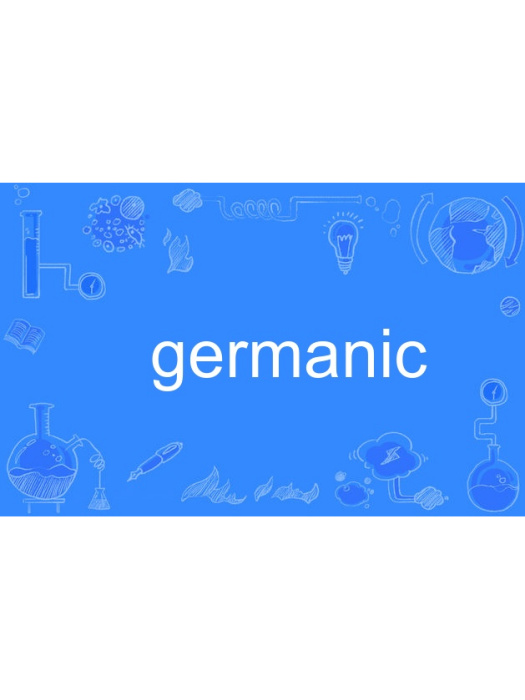germanic,英語單詞,主要用作形容詞、名詞,作形容詞時譯為“德國的;日耳曼語的;德語的;日耳曼人的”,作名詞時譯為“日耳曼語”。
基本介紹
- 外文名:germanic
- 詞性:形容詞、名詞
- 英式發音:[dʒɜːˈmænɪk]
- 釋義:德國的;日耳曼語的;德語的;日耳曼人的|日耳曼語
單詞用法
短語搭配
雙語例句
- 1English is a member of the Germanic group of languages.英語是日耳曼語系中的一種語言。《牛津詞典》
- 2He asked in his Germanic English if I was enjoying France.他用他那德國式英語問我在法國玩得是否愉快。《柯林斯英漢雙解大詞典》
- 3Germanic generals sometimes used their military power to advance their own and their tribes' interests.日耳曼將軍們有時會利用他們的軍事力量來為自身和部族獲取更多利益。
- 4The foremost probably was the sheer need for military manpower that made it attractive to recruit bands of Germanic peoples for the armies.最重要的可能是對軍事人力的絕對需求,這使得招募日耳曼人加入軍隊變得很有吸引力。
- 5The West then was exposed to the more volatile tribal Germanic peoples on a frontier that stretched along the Rhine and Danube rivers for 1,000 miles.當時,德國西部的邊境沿著萊茵河和多瑙河延伸了1000英里,那裡的日耳曼部落更加動盪不安。
- 6The West was then exposed to the more volatile tribal Germanic peoples on a frontier that stretched along the Rhine and Danube rivers for 1,000 miles.當時,德國西部的邊境沿著萊茵河和多瑙河延伸了1000英里,暴露在邊境處變得更加動盪不安的日耳曼部落之下。
- 7One of the most outstanding features at the beginning of this period was the prominence of Germanic generals in the high command of the Roman Imperial army.這一時期初期最突出的特點之一是日耳曼將軍在羅馬帝國軍隊中的顯著地位。
- 8Western emperors after Theodosius were unable to emphasize their civilian role because of their need to rely on the protection of Germanic generals loyal to them.狄奧多西之後的西方皇帝無法強調他們的公民角色,因為他們需要依賴於對他們忠誠的日耳曼將軍的保護。
- 9She had an almost Germanic regard for order.她簡直像德國人一樣講究條理。《牛津詞典》
- 10He recognized that Sanskrit, the language of India, was related very closely to Latin, Greek, and the Germanic and Celtic languages.他認識到梵語,即印度的語言,與拉丁語、希臘語、日爾曼語和凱爾特語密切同源。《柯林斯英漢雙解大詞典》
- 11Originally, it was a Germanic language and then after the Norman Conquest in 1066, there was an enormous influx of French words.最初,它是日耳曼語,而在1066年諾曼征服之後,大量法語辭彙湧入(英語)。
- 12One way to turn Germanic chieftains from potential enemies into loyal supporters was to offer them a good position in the Roman military.為日耳曼部落首領在羅馬軍隊中尋得一個好職位,是化潛在敵人為忠誠支持者的一種方式。
- 13Resentment against Germanic chieftains achieving high rank in the Roman military and factionalism among Roman leaders were among the causes of the period's considerable instability.對於日耳曼部落首領在羅馬軍隊中獲得高地位的不滿和羅馬領導人之間的黨派之爭是該時期局勢劇烈動盪的一部分原因。
- 14This was from Old English and Germanic roots.“道路”、“路徑”的詞根來自古英語和日耳曼語。
- 15Doctors were called leeches based on a Germanic root that meant "to heal."基於表示“治癒”的日耳曼詞根,醫生也被稱為leeches。
- 16Privately, Mr Van Rompuy’s instincts may be more Germanic than French.就個人而言,范佩龍的直覺比起法國式的而言似乎更趨向於德國。
- 17Privately, Mr Van Rompuy's instincts may be more Germanic than French.就個人而言,范佩龍的直覺比起法國式的而言似乎更趨向於德國。
- 18Long before English was English the roots of this word were likely Germanic.在英語還未成形之前,這個詞的詞根可能源於德語。
- 19So both stammer and stutter evolved from the same Germanic language family.因此,stammer 和 stutter 都由日耳曼語語系演化而來。
- 20Frolic first appeared in English in the 16th century and came from Germanic roots.frolic在16世紀第一次出現在英語中,詞根來源於日耳曼語。
- 21No one knows what made the Germanic language branch off from the Indo-European family.無人知曉什麼原因導致了日耳曼語從印歐語系中脫離。
- 22All the Old Germanic languages had words beginning with hl -, hn -, hr -, and hw -.所有的古日耳曼語言中,都有以字母組合hl -,hn -,hr -和hw -開始的單詞。
- 23It came to English from Latin and shows up in a bunch of other Germanic languages as well.它從拉丁語進入英語,而且它也在其他一些日耳曼語言中出現。
- 24The siren is the Greek variant, with similar beings found in Germanic and Celtic cultures.海妖是希臘文化中的一個變體,但在德國和凱爾特文化中可以找到類似妖魔。
- 25The word nightmare was already a word before it came into English from Germanic languages.英語單詞“夢魘”(nightmare)源自於日耳曼語。
- 26Norse mythology was a collection of beliefs and stories shared by Northern Germanic tribes.挪威童話是北部日耳曼部落流傳的故事匯總。
- 27The parent word to rug is reported to be Scandinavian and as such of Germanic extraction.“rug”的起源,據說是從斯堪的納維亞語和部分日耳曼語中提取出來的。

